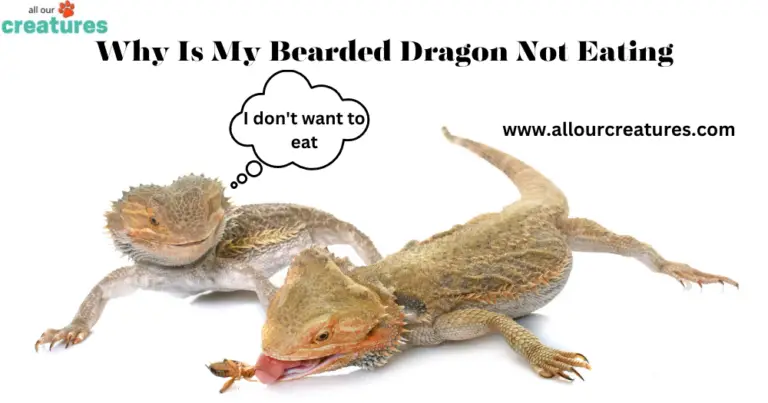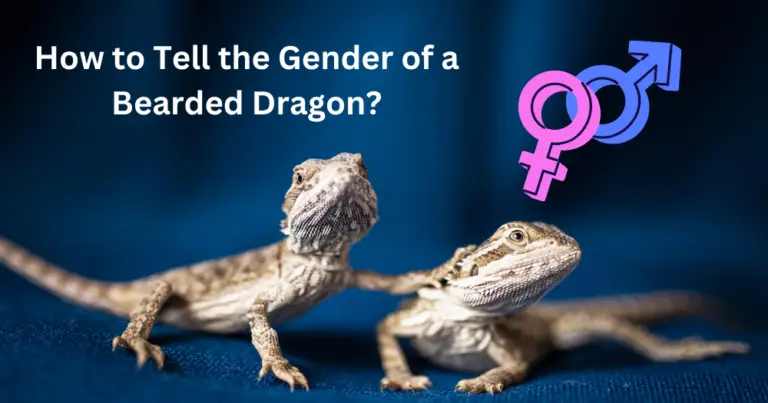How Long Can a Bearded Dragon Go Without Eating
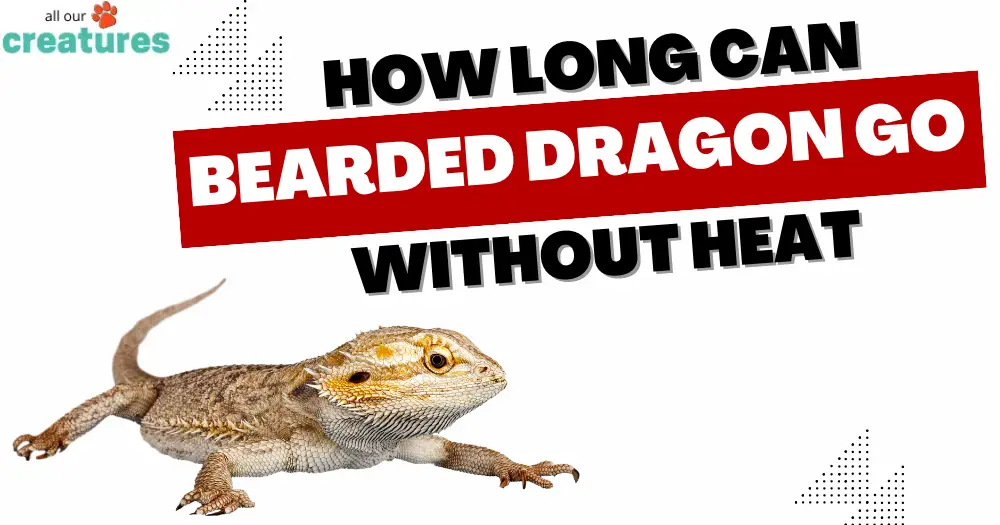
Bearded dragons are known for their healthy appetite and love for food, but there may be instances when they refuse to eat. As a responsible owner, it’s essential to understand How Long Can a Bearded Dragon Go Without Eating and what factors might contribute to their temporary loss of appetite.
In this guide, we’ll explore the typical feeding patterns of bearded dragons and discuss the potential implications of extended periods without food.
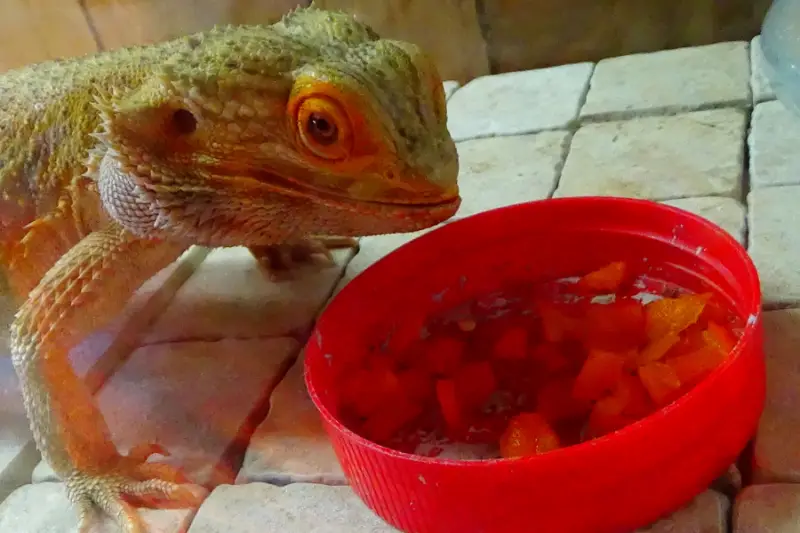
Contents
Table of Contents
How Long Can a Bearded Dragon Go Without Eating: Ultimate Guide

Bearded dragons are fascinating reptiles that have become popular pets in recent years. As their owners learn more about these unique creatures, they begin to wonder about their capacity to go without food, especially when compared with other animals.
Adult bearded dragons have been known to go without food for up to four weeks if they possess sufficient fat stores, although this is not recommended and daily feeding is encouraged. It is important to note that some adult bearded dragons may voluntarily stop eating for up to four months during a period called brumation, which is the reptile version of hibernation.
However, the longest recorded time that a healthy adult bearded dragon has been able to survive without food is about two months, given ideal conditions and sufficient fat deposits.
Factors Affecting Bearded Dragon’s Eating
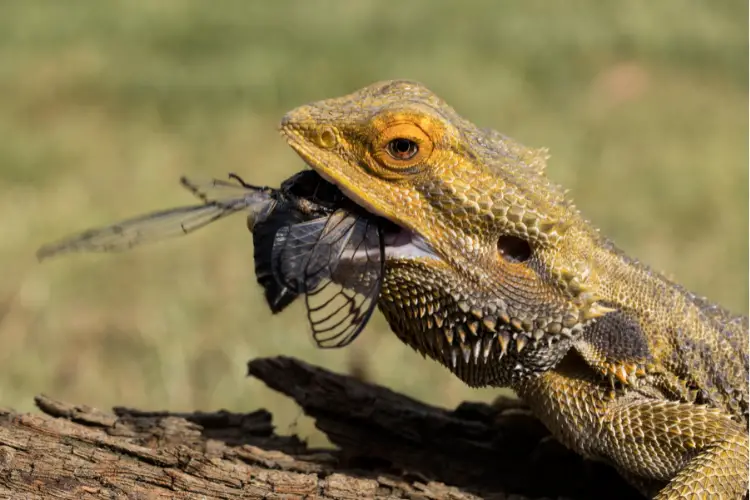
Age
Bearded dragons have different nutritional and eating requirements at various stages of their life. For instance, juvenile bearded dragons require a high amount of protein, as they are still growing, and may consume anywhere from 20 to 60 insects each day.
In contrast, adult bearded dragons consume fewer insects and need a more balanced diet of vegetables and fruits.
Health
The health of a bearded dragon can directly impact their eating habits. A healthy and well-fed adult beardie can go up to 2 months or longer without food. However, this is not optimal, and a healthier diet would consist of daily feedings.
On the other hand, sick or undernourished bearded dragons may experience difficulty eating or maintaining a consistent appetite. It is essential to consult a veterinarian if you notice significant changes in your lizard’s appetite or health.
Stress
Stress plays a vital role in a bearded dragon’s eating habits. A stressed lizard may eat less or not at all. Various factors causing stress include handling, changes in the environment, and cohabitation with other pets. To minimize stress, ensure your bearded dragon has a secure and comfortable habitat, maintain consistent temperatures and lighting, and provide the appropriate humidity levels.
Environment
The environment, particularly temperature and lighting, can have a significant effect on a bearded dragon’s appetite. Bearded dragons need suitable basking temperatures to efficiently digest their food and maintain a healthy metabolism.
Ensure that the basking area temperature is around 95-105°F (35-40°C) for adults and 105-110°F (40.5-43.5°C) for juveniles. Proper lighting, including UVB light exposure, is also crucial, as it plays a role in the synthesis of essential vitamins and calcium regulation.
Brumation
Brumation, a hibernation-like state, occurs in winter and can significantly reduce a bearded dragon’s appetite. While brumating, a bearded dragon may go weeks, if not months, without eating. However, it is crucial to provide water on a regular basis to prevent dehydration.
Remember that not all bearded dragons experience brumation in captivity, so consult a veterinarian if you have concerns about your pet’s reduced appetite during winter.
Signs to Look Out for When Bearded Dragon Stops Eating
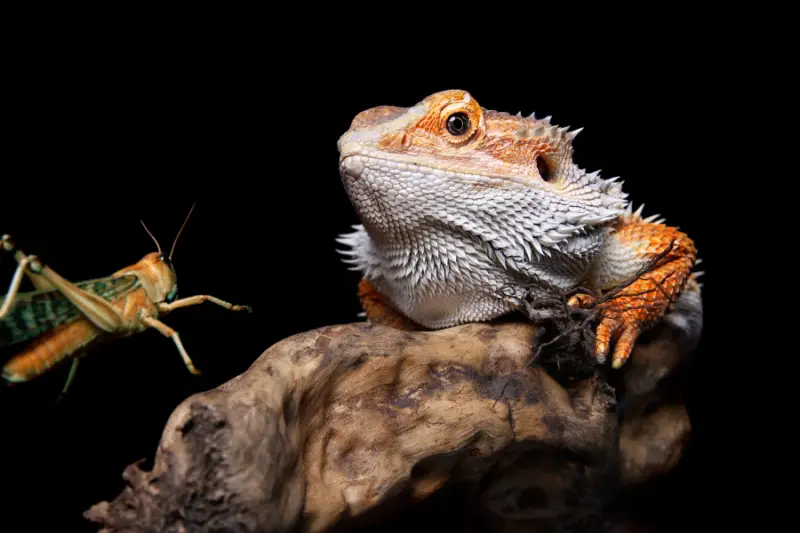
In this section, we will discuss several factors that might cause a bearded dragon to stop eating and the signs to look out for in each case.
Illness
When a bearded dragon is not feeling well, it may exhibit signs of lethargy, loss of appetite, and general discomfort. It is important to monitor your pet’s behavior closely and consult a veterinarian if you suspect illness. Signs of illness in bearded dragons can include diarrhea, changes in feces, and difficulty breathing.
Impaction
Impaction is a common issue in bearded dragons that occurs when the reptile is unable to pass feces due to a blockage in its digestive system. It can be caused by various factors, such as incorrect substrate, ingesting small objects or consuming food that is too large. Signs of impaction include a lack of feces, swelling in the abdomen, and discomfort when touched.
Parasites
External and internal parasites can cause bearded dragons to stop eating. Parasitic infections can lead to lethargy, weight loss, and changes in their feces. It’s crucial to have your bearded dragon examined by a veterinarian to diagnose and treat the parasitic infection.
Metabolic Bone Disease
Metabolic bone disease (MBD) is a common health issue in bearded dragons, caused by a lack of proper nutrition and inadequate exposure to UVB lighting. Symptoms of MBD include:
- Weakness and lethargy
- Softening of bones, including the jaw and limbs
- Swelling in limbs and tail
- Twisted or bent limbs
- Loss of appetite
If you suspect MBD, it is crucial to consult a veterinarian and ensure that your bearded dragon is receiving proper nutrition and UVB lighting.
Dehydration
Dehydration can occur in bearded dragons for various reasons, including inadequate water intake or excessive heat exposure. Dehydrated bearded dragons may exhibit signs such as sunken eyes, wrinkled skin, and loss of appetite. Providing a shallow water dish and regularly misting your bearded dragon’s enclosure can help prevent dehydration.
In summary, closely monitoring your bearded dragon’s behavior and consulting a veterinarian when necessary can help address any issues causing a loss of appetite.
Bearded Dragon Nutrition and Diet
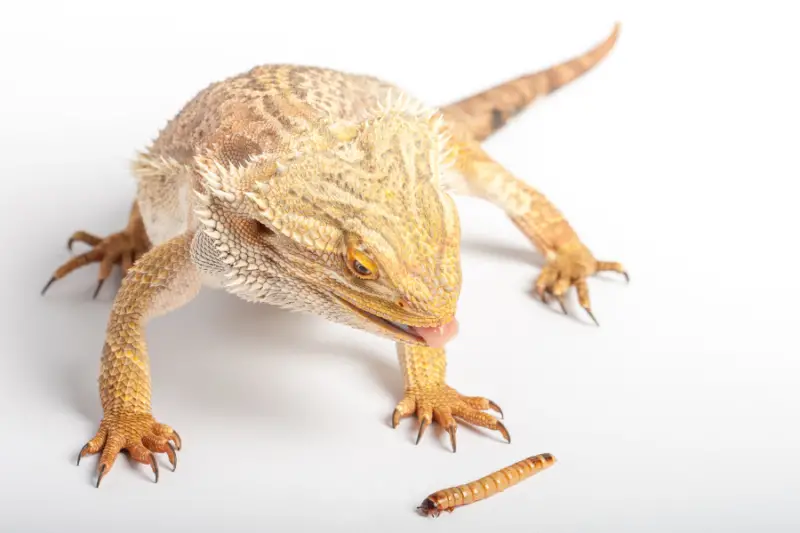
Protein Sources
Bearded dragons require a healthy balance of protein, vegetables, and fruits in their diet. Young dragons benefit from a greater intake of protein, mainly through insects. Typically, these reptiles consume as many insects as possible within a 10-15 minute time period up to three times a day. They can also eat small amounts of cooked lean meats, ensuring their protein needs are met.
Greens and Vegetables
Vegetables and leafy greens constitute an essential part of a bearded dragon’s diet, especially for mature dragons. Veggies should make up about 70-80% of their diet to ensure adequate nutrition.
Offer a variety of dark, leafy greens and vegetables daily, such as collard greens, kale, and bell peppers. Remember to chop them into bite-sized pieces for easier consumption.
Fruits
Although fruits are beneficial and enjoyable for bearded dragons, they should only make up 10-20% of their diet. Be sure to provide a variety of fruits, such as strawberries, melons, and apples, and avoid high-oxalate fruits that may lead to nutritional deficiencies.
Calcium and Supplements
To prevent bone and growth issues in baby dragon and adult beardies, calcium and vitamin supplements are necessary. Offer dusted calcium on their insects and vegetables at least twice a week. Also, ensure your dragon receives adequate UVB light for healthy bone development.
Water
Hydration is essential for your scale baby, but they might not actively drink fresh water from a dish. To keep them hydrated, provide water through misting their enclosure and including water-rich vegetables in their diet.
Also, provide a shallow water dish for them to soak in and potentially drink from.
By providing a balanced diet, you are ensuring your bearded dragon’s overall health and well-being. Meeting their nutritional needs will help them thrive throughout their life.
HOW LONG CAN YOU LEAVE YOUR BEARDED DRAGON OUT??? Watch this
How Bearded Dragons Survive Without Food
Sleep and Hibernation
Bearded dragons are known to go through a process called brumation, which is a form of hibernation. During this period, they can sleep for weeks or even months, reducing their metabolism and energy requirements. Brumation helps bearded dragons survive for extended periods without food while still maintaining their overall health.
Fat Stores and Reserves
Adult bearded dragons can rely on their fat stores and reserves to survive without food for some time. With enough fat and water, adult dragons can go up to two months without food. However, this is not recommended as it can lead to serious health problems, such as organ failure and muscle loss.
Body Temperature
Bearded dragons are ectothermic, which means they depend on external sources to regulate their body temperature. They often bask under a heat lamp or in sunlight to increase their body temperature. A lower body temperature coupled with a reduced metabolic rate allows them to survive longer periods without food.
Survival Period
The specific length of time that a bearded dragon can go without food varies depending on their age, health, and body condition. Adult bearded dragons can survive:
- Up to 4 weeks if they have enough fat stores, not recommended though.
- Up to 4 months without food during brumation.
For juvenile dragons, who are rapidly growing and require more nutrients, going long periods without food is inadvisable. They need protein and other vital nutrients to grow healthy and strong.
Correcting Feeding Issues in Bearded Dragons
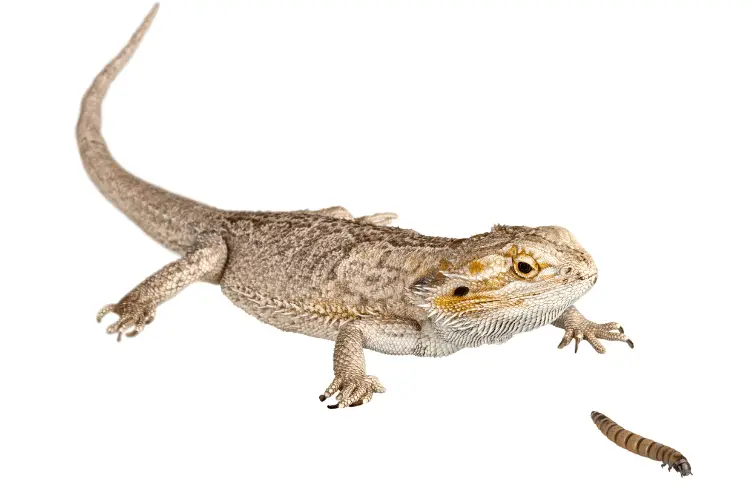
Check Environmental Conditions
To ensure your bearded dragon’s health, it is essential to check their vivarium’s environmental conditions. Maintaining proper temperature and humidity levels can help with their digestion and bowel movements. Regularly inspect the vents and heating elements to ensure they are functioning correctly.
Modify temperature and humidity settings according to your bearded dragon’s needs.
Consult a Reptile Vet
If your bearded dragon is still not eating or shows signs of stress, such as diarrhea, you should consult a reptile vet. They can help diagnose and treat any underlying health issues and provide guidance on proper feeding and care.
Try a New Diet
Sometimes, a bearded dragon may need a new diet to maintain their health. Examine your dragon’s dietary habits and ensure it is receiving a balanced diet, including both insects and greens. If the current meals seem unappealing or insufficient, try introducing various food items and monitor their interest.
Monitor and Adjust Humidity and Temperature
Continually check the humidity and temperature levels in your bearded dragon’s living space. Adult dragons typically require a lower humidity level than juveniles. Use a thermometer and hygrometer to measure the levels and adjust them according to your dragon’s age, size, and preferences.
Force Feeding
In extreme cases when a bearded dragon continues refusing to eat, force feeding may become necessary. This method should be considered as a last resort and only performed under a reptile vet’s guidance. The vet will provide instructions on how to force-feed your bearded dragon safely and effectively.
Preventive Measures
To prevent feeding issues in bearded dragons, consider the following tips:
- Provide a well-balanced diet that includes fresh vegetables, fruits, and insects.
- Maintain appropriate temperature and humidity levels within the vivarium.
- Observe your dragon’s poop and bowel movements for any irregularities.
- Ensure the vivarium is well-ventilated and clean.
- Schedule regular checkups with a reptile vet.
Taking these preventive measures can help maintain your bearded dragon’s overall health and significantly reduce feeding-related issues.
FAQS: How Long Can a Bearded Dragon Go Without Eating
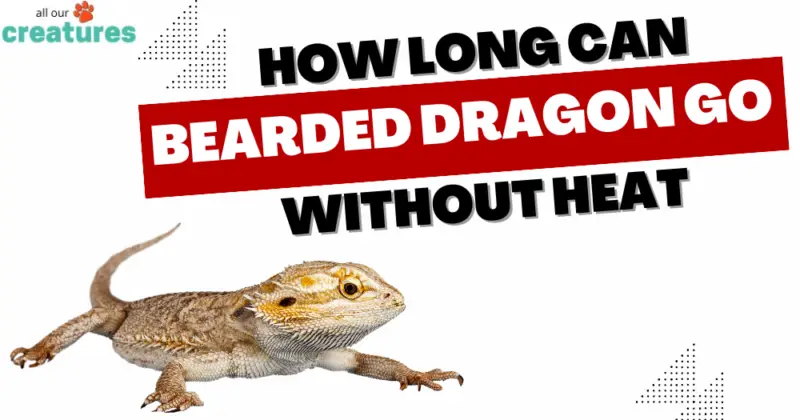
How often should I feed my bearded dragon?
Both baby bearded dragon and adult bearded dragon, have different feeding requirements. Baby bearded dragons may need to be fed multiple times a day, while younger dragons can be fed once or twice a day. It’s important for a bearded dragon owner to establish a feeding schedule that suits their age and needs.
What should I include in a bearded dragon’s diet?
A healthy diet for bearded dragons should consist of a variety of foods. This includes live insects, such as crickets or dubia roaches, leafy greens like collard greens, and vegetables. Providing a balanced mix of protein, vitamins, and minerals is crucial for their well-being.
Why has my bearded dragon stopped eating?
There can be various reasons why your bearded dragons stop eating. It could be due to stress, changes in their environment, wrong feeding time, new food to them, or even a natural occurrence like shedding. Sick bearded dragon can refuse food too. It’s important to monitor the behavior of your pet dragon and consult a veterinarian if the loss of appetite persists.
Should I be concerned if my bearded dragon refuses to eat?
While a temporary decrease in appetite is common, a prolonged refusal to eat can be a sign of an underlying health issue. It’s recommended to seek veterinary advice if your pet bearded dragon consistently refuses food, especially if accompanied by other concerning symptoms.
Can bearded dragons survive without eating for a few days?
Healthy adult bearded dragons can typically tolerate a few days without eating, especially if they have sufficient fat stores. However, it’s crucial to address the underlying cause and encourage them to resume their normal eating habits. If you have concerns, consult a veterinarian for guidance.
Bearded dragon owners should note that these FAQs provide general information and it’s always best to consult a reptile veterinarian for personalized advice regarding your bearded dragon’s specific needs.

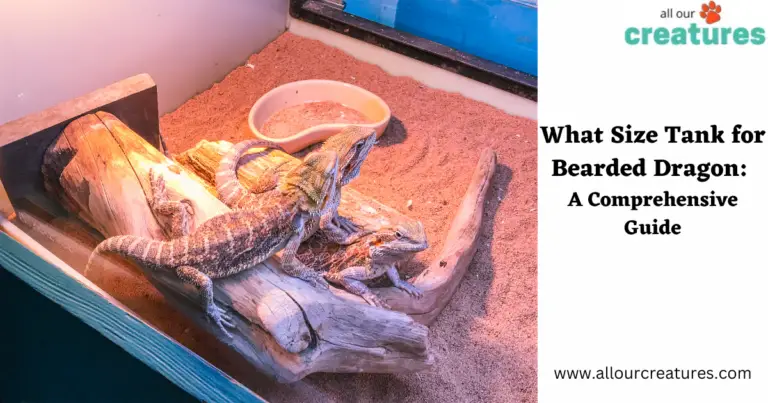
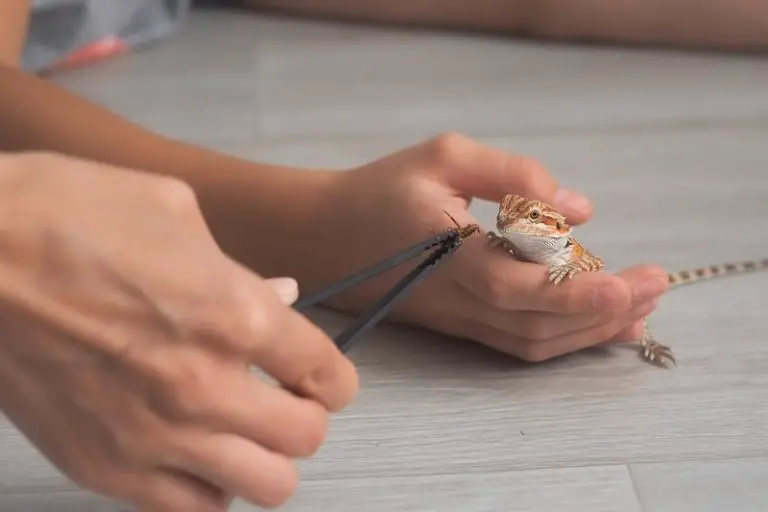
![Best Insects For Bearded Dragons [Must Read]](https://allourcreatures.com/wp-content/uploads/2021/10/bigstock-A-Bearded-Dragon-pogona-Sp-E-412949071-768x512.jpg)
![Best Bedding For Bearded Dragons [Full Guide + Top Options]](https://allourcreatures.com/wp-content/uploads/2021/12/bigstock-Bearded-Agama-latin-Pogona-V-396699188-768x498.jpg)
